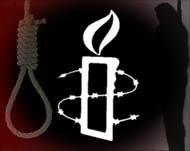Lebanon executes three despite objections
Lebanon has resumed executions after a five-year hiatus, putting to death three convicted killers, despite objections by human rights groups and the European Union.

“It is done,” said Ibrahim al-Hariri, lawyer for two of the men. The three men were executed at dawn on Saturday in the courtyard of Beirut’s Roumieh prison, two by firing squad and one by hanging.
The last executions in Lebanon were of two murderers in May 1998, both hanged in public.
Before the executions, the European Union and human rights groups had called on Lebanon to abolish the death penalty.
‘Dismay’
The EU Presidency on Friday expressed “dismay” at the Lebanese decision and urged Lahoud to use his authority to reverse the decision.
The local Future TV station on Saturday quoted French Foreign Ministry spokesman Herve Ladsous as saying the executions violated a commitment the Lebanese government made when it signed the partnership agreement with the EU in 2002.
“Beams of hope lit by a de facto five-year moratorium on the death penalty have been dimmed by Lebanon’s decision to kill these men,” said Amnesty International on Friday.
“Their lives and those of 24 others under sentence of death whose fate may well be similar are now at the gravest risk imaginable, and no effort should be spared to save them,” added the human rights watchdog.
Angry voices
 |
|
Amnesty has condemned |
Dozens of Lebanese human rights activists marched to parliament carrying black flags on Friday to try to prevent the executions, and others held an all-night vigil near the prison.
“This is inhuman and degrading,” said Lala Arabian, a Lebanese human rights lawyer, on hearing the executions had been carried out.
Ahmad Mansur was executed by hanging, while Badi Hamada and Remi Zatar were executed by firing squad.
Mansur was charged of killing eight co-workers in July 2002, while Zatar was convicted of killing two members of the civil defence and a Syrian army officer in June 2002. Badi was accused of killing three Lebanese soldiers in the summer of 2002.
Security officials said the men’s families were permitted to spend half an hour with them on Friday night, but were not allowed to witness their executions.
Clergymen for the three men, a Christian, a Shia and a Sunni Muslim, were allowed to see them before their deaths, as well as a judge to take down their wills.
A security source said the bodies of the three men had been
taken to a hospital morgue and families could claim them later.
‘Rocking the security’
|
“This is inhuman and degrading” Lala Arabian, |
A government source declined to say whether any other death sentences would be carried out soon, saying it would be decided on a case by case basis.
He dismissed criticism of the death penalty, saying the convicts had committed crimes that “rocked the security and stability of the state”, and they deserved to be put to death.
When Lahud took office, his prime minister at the time, Salim Huss, was an opponent of the death penalty and refused to sign any orders for execution.